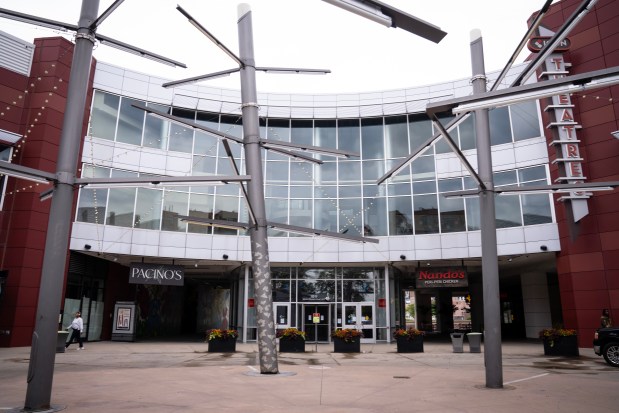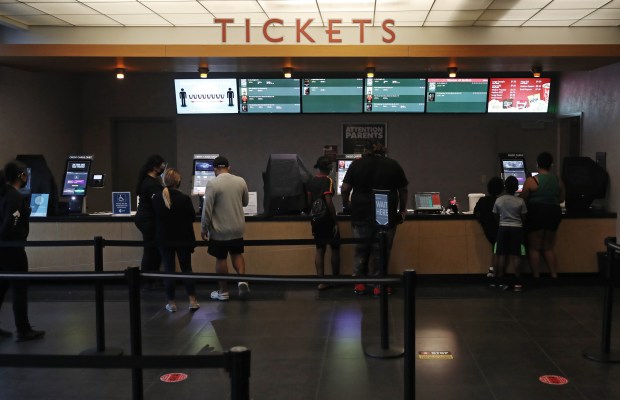At the back of the U-shaped Roosevelt Collection retail complex, on Delano Court at Roosevelt Road, there’s a multiplex for lease. Until the last day of June, the place wasn’t just a place. It was a ShowPlace: The Kerasotes ShowPlace ICON.
And now? The Roosevelt Collection management company is taking meetings in search of a new operator. And the South Loop movie options are, at present, none.
When it opened in 2009, the ICON theaters made news. Here was a sleek attempt to bring some luxe to the South Loop, with impressively deafening sound, bright image quality (usually) and a bar upstairs. The 16 auditoriums at the Roosevelt Collection site featured all-digital projection, making it the first all-digital, no analog Chicago multiplex.
“Yeah,” Tony Kerasotes told me the other day on Zoom, from his home in Tucson, Arizona. He’s retired now. “It was cutting-edge back then.”
He and his brother, Dean, decided to call it quits some weeks ago. The closing notice went up on the front door June 30, thanking patrons who had plans to see “Inside Out 2” or something else there that day for their “unwavering support, loyalty and enthusiasm over the many years.”
“Most of our peer group,” he said, referring to other U.S. chains, “went out of business three or four years ago. We kind of hung on. Maybe that wasn’t the wise thing to do. But we decided we’d put enough money into the business, and so we gave the properties back to the landlords.”
The legal untangling, he said, is underway. Dozens of screens in three other ShowPlace ICON locations likewise gave it up this week, in suburban Minneapolis (St. Louis Park) and in California (Mountain View and San Jose). Last month the ICON in Secaucus, New Jersey was sold to the Regal Theaters chain. As reported by Tom Brueggemann in IndieWire, the St. Louis Park venue may be picked up by Milwaukee-based Marcus Theatres.
In our city, the South Side has had decades of frustrating, here-today, gone-tomorrow access to big screens. The Chatham Studio Movie Grill opened in 2017 and made a go of it, uneasily, through the first year of COVID. It closed its 14 screens in 2021. There is, however, a promising recent reopening in Hyde Park of the Harper Theater, with a facelift accompanying that 1915 venue’s latest redux. It’s run by Omaha, Nebraska-based Main Street Theatres.
With the ICON closed, for now, at least, the ACX Harper is the best South Side option for miles around.
For much of the previous century, the Kerasotes family invested in small-town Illinois. This, Kerasotes says, dates back to “when entertainment meant high school sports, or the movies.”
First came a nickelodeon in Springfield, in 1909. The Royal Theatre, 214 S. Sixth St. “That’s where everything started,” Kerasotes said. He’s not a nostalgic guy; he’s more matter-of-fact. “My grandfather, Gus, converted his confectionary into a nickelodeon. A lot of the Greeks made a living running confectionaries back then.”
The business grew, along with the popularity of picture shows. In Springfield, Gus Kerasotes opened a lavish movie palace with a pipe organ in 1920. Then another. His sons expanded the business downstate, on one main street after another.
The family “was very good for the state of Illinois, more than people might realize,” says Chris Johnson, who oversees the hardy and resourceful Classic Cinemas chain. “They pretty much had a theater in every small town in the state and, at one point, they were the biggest chain outside AMC, Cinemark and Regal. And they advocated for other theater owners. Myself included.”
I asked Kerasotes what he won’t miss about the movie business, in Chicago and elsewhere. Well, he says, “the crime problem. That has been a problem, particularly in Chicago.” Then, sounding like a lot of Arizona transplants who used to live in Illinois, he adds: “It’s not a problem everywhere.” Last April, for example, gunshots were fired inside the ShowPlace ICON lobby, no injuries but plenty of nervous fallout. Last July, unruly customers, multiple arrests and a security officer died on the job of a heart attack.
“Public safety,” Kerasotes says. “Going out to the movies in Chicago shouldn’t be such an ‘adventure.’ The city’s going to have to start arresting more people and putting more people in jail than they do now.”
Nevertheless, he says, the decision to shut it all down wasn’t about the crime. It was just time, he says. It was getting too hard to weather the financial headwinds, the uncertain audience devotion, all of it.

And yet, he acknowledges, look at last year: “Barbie,” “Oppenheimer,” boom. And now that the Hollywood writers’ and actors’ strikes are settled, the production pipeline might start flowing again — if the industry isn’t actively destroying the business of movies in theaters en route to figuring out how to not lose money in the streaming lane.
And just look at the last couple of weeks, Classic Cinemas head Johnson notes, with “Inside Out 2”: It’s already the third biggest-ever moneymaker for the Classic Cinemas chain, behind “Avatar” and “Barbie.”
You never can tell.
Meantime, here’s a statement from CBRE Property Management director Deirdre Larsen, who’s talking to potential operators and looking for someone who’s looking to take over the Icon, formerly run by brothers Tony and Dean Kerasotes:
“The ICON … has served the community as one of the best performing theaters in the Chicago area and it is closing as a result of its parent company ceasing all operations nationally. (We are) having active conversations with potential new theater partners. We look forward to sharing our plans with the community once finalized.”
Michael Phillips is a Tribune critic.



